For decades, students at one of California’s best-known winemaking schools have been forced to dispose of their finished product. Although the University California, Davis – a little more than an hour north of San Francisco – has long sourced grapes from top Napa Valley vineyards that it owns in areas such as prestigious Oakville, these wines were never legally available for sale.
According to Chik Brenneman, UC Davis’ viticulture and enology department winemaker, other enological schools – such as Fresno State – have long been selling their wines through someone else’s license. For example, the wine store at Fresno State sells students’ wines to California residents who are members of their wine club and of legal drinking age for $50.00 for a four-pack. According to a spokesperson, Fresno State was the first to have a commercial winery with a license – obtained in 1997 – to produce and sell wine on a US university campus. Brenneman added that the practice is also common in Europe at winemaking schools such as Geisenheim University, as “they are not as constrained by the laws are we are.”
Thanks to a recent measure – Senate Bill 683 passed in the California legislature – the school will be able to bottle and sell wines made by its students for profit. After years of trying to sort out legal ways to bring its wine to market, UC Davis lobbied to have the phrase removed from the legal wording which stated that “no state entity could produce or sell alcohol in the state of California,” according to Brenneman.
It is as of yet unclear if these wines will be sold to private collectors or local producers, but some of the first bottles are likely to be served at events at the university. All profits will go back to support the school’s enological programs. As the bill was passed in September 2016, Brenneman hopes to be able to bottle and store the wine in time for harvest in the fall of 2017.
Good volumes
The amount of wine in question is not minor. “In the past year we crushed about 100 tons of grapes and produced about 26,000 litres of wine,” added Dr David Block, a professor and chair of the department of viticulture and enology at UC Davis. Student reaction, he noted, “has been positive, especially knowing that the proceeds will go back into the viticulture and enology program.” He went on to explain that the viticulture and enology department pays for maintaining vineyards and a winery that are used for teaching and research, so state money does not cover all its costs. “Therefore, in essence, we are recouping some of the costs of producing the grapes and wine for research and teaching.”
The legislation, according to Block, has set up a non-profit organisation which holds a special wine sales license. As the University’s name will be on the label, Block confirmed that the school will be selective about where the wines end up.
The school routinely brings in grapes from around the state, “including upwards of 20 different grape varieties or more, so there will be opportunity to experiment – if it makes sense from a teaching or research point of view.”
The new law will also allow both students and faculty to continue to respect their ongoing goal of being one of the most sustainable wineries in the world. “We are working toward being a completely self-sufficient winery in water and energy and capturing all of our carbon dioxide. In this kind of facility, to be the wine produced down the drain, as we have done for years, is not environmentally sustainable,” said Block. What is more, he noted that it is not financially sustainable either.
Some of the wines students produce may end up on the bulk market and some may hit the shelves in bottle. Given that the Cabernet Sauvignon sourced from neighboring Napa Valley vineyards often fetches $100.00 or more for a 750-ml bottle, Block has high hopes for the profitability of the sales endeavor.
Block added that other universities have sold wine for profit in the past, which often involved private foundations holding a bond or a license. However, UC Davis “will not cede control of its winery to an outside organisation. Instead, the new non-profit entity established will be able to accept wine [directly] from our winery.” It promises to be a new day, and a new wine market, for one of California’s top enological schools.








